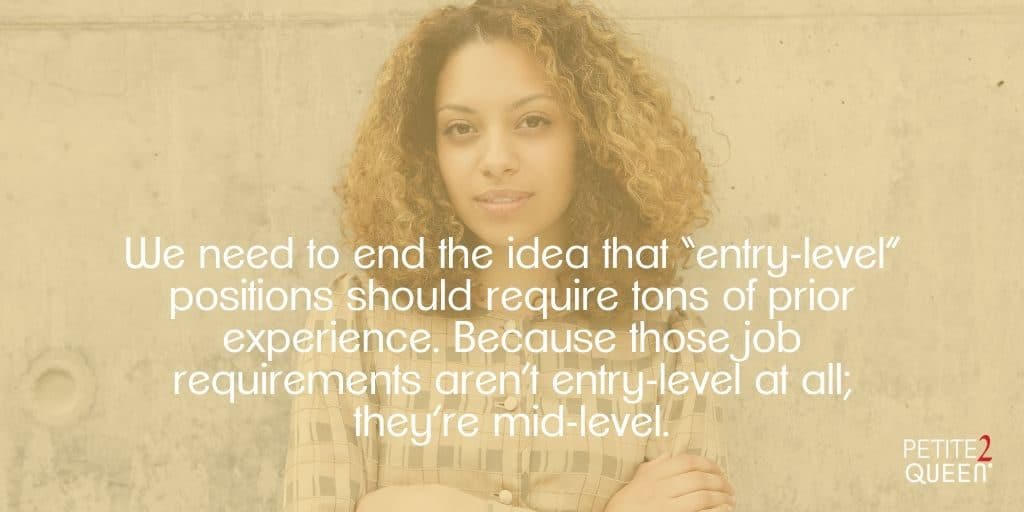Since childhood, many have wondered, “Which came first, the chicken or the egg?” Nowadays, a more pertinent question young workers often find themselves asking goes more like, “Which comes first, the job or the experience?” Indeed, many recent graduates are stuck in an uncomfortable position, unable to get an entry-level job because they don’t have enough qualifying experience… yet unable to get that needed experience because they can’t get hired.
How is it that so many educated, talented people can’t secure an entry-level job? They’re stuck in a catch-22, and it’s wreaking havoc on young workers and their futures.
How Much Experience Does it Take to Get Your First Job?
What is an entry-level job? As the name suggests, it should be a job that requires no prior experience other than your education. It’s something you should be able to get right out of high school or college, depending on the position and industry. Your first job – even your first few jobs – will likely be entry-level.
Unfortunately, in recent years, what’s considered an “entry-level” job has seen some hindering changes. Probably all of us have been there: We recently graduated and are searching for our first job. Naturally, we expect to start off in an entry-level position. But as we read through numerous job listings, we start to notice something alarming: They all require between 2 and 5 years of relevant experience! Surely there’s some mistake? How can an entry-level job require years of prior experience? How can you already have that much experience before attaining your first job?
Employers seem to have forgotten what “entry-level” means. Or, perhaps more likely, they want to hire someone who’s more experienced and can perform more significant work, but who will still accept the entry-level salary. The jobs they’re posting either aren’t entry-level, despite the label attached to them, or they are and should not require all that experience.

What Happened to All the Real Entry-Level Jobs?
So where did all the real entry-level jobs go? They became internships. As harmless as that sounds, a majority of internships are unpaid – something we at Petite2Queen are vehemently against. The work that once earned college grads an entry-level salary is now being offered without pay. Not everyone can afford to work for free, meaning internships are serving as a gate-keeper against lower-income grads trying to work their way up. Moreover, internships aren’t valued as highly as actual jobs, meaning their inclusion on your resume isn’t always beneficial.
Internships – especially unpaid ones – often don’t help you secure a paid job in your field. And if you worked in low-level jobs throughout high school and college, that experience may not count towards the positions for which you’re applying either, as it’s not considered “relevant.” Your four years as a cashier at a grocery store and two years as an unpaid intern may not impress the HR manager at the marketing firm you’d like to work in.
And what about your college degree – surely that counts for something? It used to be that prior experience could come in the form of either on-the-job training or higher education. You weren’t expected to have both. But over the years, things changed, and college alone isn’t enough. Now, hiring managers often do need to see both on your resume. So, unfair as it is, while your education should count as experience, not all companies see it that way. Degrees alone aren’t enough to stand out.
Young Workers: Stuck Between a Rock and a Hard Place
This catch-22 of needing relevant work experience to get your first job has left an entire generation of workers stuck in a terrible position. Those jobs that were promised to us – so long as we earned our college degrees – haven’t materialized. Recent graduates aren’t finding work as readily or quickly as before, and once they do secure jobs, they’re often either in the wrong industry, aren’t full-time, or pay ridiculously low wages.
College grads may become desperate for an income, but they often can’t fall back on the low-level jobs they had in high school. Companies don’t want to hire people who are over-qualified, logically assuming that the employee will just quit as soon as they get a proper job befitting their education. Never mind that they aren’t getting those jobs, either. These young people are stuck in a limbo of either over-qualified or under-qualified for nearly every position they find.
With dismal job prospects and minimal or no income, young people are forced to live with their parents longer. They can’t make payments on the students loans the majority of college graduates took on. And of course, they can’t buy homes, get married, or have kids as young as previous generations did. These issues famously plague the millennial generation; will they encumber Gen-Z next?

Unempowered: Lower Loyalty, Higher Turnover
Millennials have changed jobs more than any previous generation did in the first 10 years out of college. They’ve have earned a reputation for job-hopping, something many employers find undesirable and even concerning in their job candidates. Naturally so, since the presumption is that, if hired, the employee will only up and leave several months later. High turnover negatively impacts the company as much as it hampers these young workers.
The truth is, young workers don’t lack loyalty or a good work ethic. What they lack is jobs that meet their qualifications, pay them fairly, and treat them with loyalty. This generation of workers is scrambling up the ladder any way they can, but it involves a lot more movement between companies than previous generations’ climbs. If job A is fine and pays only $15 per hour, but job B is closer to their desired career or pays one dollar per hour more, you can bet the employee will switch jobs.
Young workers truly do want to find a company they can stick with long-term. The lowered morale and increased mobility between jobs is a direct response to the job market they’ve entered. Once these workers find the right job, the right company, and fair pay, they will settle down. But until they do, they will continue taking any opportunity they can get.
This Hurts Entire Careers
The entry-level issue doesn’t just harm young workers, fresh out of college and excited to get their first jobs. It delays their career beginnings, not just by months, but by years. The postponed career launch means delayed advancements in careers. While our parents may have secured jobs by age 22 and been promoted to upper-level positions by age 30, this generation isn’t meeting those milestones until years later.
Furthermore, the lower starting salary means these workers will earn less over their lifetime than previous generations. It’s no secret that your beginning salary sets the tone for your earnings in each subsequent job. Workers tend to earn raises in direct relation to their current salary. Starting with a lower salary later in life means they’ll earn less during their lifetime. This compounds they already bleak financial prospects of today’s young workers.

Turn it Around: How to Gain Experience Without a Job
So which comes first, the job or the experience? When you can’t break into this vicious cycle, it’s time to make your own rules. If no one is ready to hire you, make your own experience.
How do I do this?!, you might ask. This will depend on the field you’re trying to get into, but the first step is to think like an entrepreneur. Consider what experience you can gain on your own, without getting past those entry-level gatekeepers. Here are a few ideas to get you started:
Start your own website:
When I finished college with a master’s in Music Business, I wanted to get into entertainment journalism. I didn’t have much experience specifically in that field, so I decided to set up my own music news website. I wrote news stories, album reviews, editorial pieces, and more, and published them on my site. Not only was I gaining solid writing practice and experience, I was also gaining other handy skills: website development and online marketing. On top of all that, my website served as a portfolio of my work that I could link to in my resume. So try it out. Set up your own website so you can write, share your visual work, and learn the ins and outs of websites.
Start freelancing:
If you have a skill but need the professional experience to prove it, consider doing this work as a freelancer. Join freelancing groups or advertise yourself in person and online. You’ll do a variety of one-time projects for diverse clients, meaning you’re growing your skills. This has the added bonus of also providing you an income, if a bit more sporadic than your regular office job. Make sure you include this on your resume and in your cover letter. It also helps to set up a portfolio website.
Learn new skills:
If you’re lacking in certain skills that all the job listings require, consider learning them through classes or a resource like Lynda.com. Think carefully as you choose what to learn, and keep your time and budget in mind. You can spend anywhere from a couple hours to several months gaining these skills, but the time will be well spent if they help you land a job.
We Need Job Positions for All Workers
With some extra hard work and determination, we all will get that first entry-level job… it just takes patience. You may be living with your parents or six roommates for longer than you’d expected, but you will get there. Do what you can to improve your resume, but also consider how we can make real changes to the job world.
It’s time to end this unfair cycle that has blocked ambitious, talented, capable young workers from getting started in their careers. We need to end this idea that “entry-level” positions should require tons of prior experience. Because those job requirements aren’t entry-level at all; they’re mid-level. Label jobs accurately so you get the candidates and employees you really need. Open up entry-level – truly entry-level – positions that inexperienced college grads will qualify for. Hire young people for those jobs, because they need it.

Likewise, stop demoting the positions that were once entry-level paid full-time work to internship status. Get rid of un-paid internships altogether, because people shouldn’t be expected to work for free.
All of us – regardless of age or career level – need to fight against the policies and companies that perpetuate these problems. Fight to put an end to unfair, inaccurate prerequisite qualifications and job labels. Demand change. When we offer paid positions for all levels of job candidates, we’ll all see the benefits. We’ll have lower employee turnover, see a more robust young workforce, and enjoy a brighter future of adults who can afford a life as comfortable as the older generations already have.
Petite2Queen provides virtual mentoring to young women in life, at work, and in sales. Follow us for more practical advice you can put to use to improve your life and career.

Amanda Whitbeck is Vice President of Operations at Petite2Queen. Since earning her master’s degree in Global Entertainment & Music Business from Berklee College of Music, Amanda has played key roles facilitating growth at start-ups. She’s also worked in diverse sectors of the music industry, from live events promotion to entertainment journalism. She brings her expertise in music business, writing, and website development to Petite2Queen.

